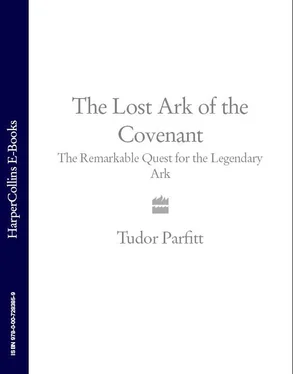1 ...7 8 9 11 12 13 ...19 ‘Is there any chance at all,’ I asked, weighing my words carefully, ‘that the treasures of the Temple of Jerusalem and Ark of the Covenant will ever be found?’ I grinned at him in what I hoped was a disarming way.
Frowning uncertainly, he scratched his forehead. ‘Oh, not another treasure seeker! Don’t tell me that Patterson has sent me a treasure -seeker!’ He spoke English with a pronounced German accent, which failed to make his tone any more agreeable.
I was embarrassed and confused by this little barb and muttered that I had a sort of marginal interest in the topic and wanted some help in preparing a short bibliography. Briefly, Rabin looked the picture of contrition.
‘Yes, well, I am sorry. It’s just that there’s been so much talk recently about the Temple treasure and quite a few odd characters have beaten their way to my door to pick my brains and waste my time. It’s quite true - they waste my time! A lot of individuals and institutions are looking for the Ark. Some are charlatans and some are downright sinister! There’s a rather overly enthusiastic American gentleman by the name of Mr Wyatt from Tennessee who claimed not long ago to have actually found the Ark in a cave just outside the city walls. No proof of course. And Wyatt is not the only enthusiast of this kind.’
‘But why are people so fascinated by it?’
What Rabin told me opened a small window into the past and changed my view of the Ark forever.
He thought the reason people were interested in it had something to do with its unmythical nature. It was a simple object with strange properties. It had great symbolic importance both for Rabbinic Judaism and for Kabbalists, but it had started off as a real object.
There were so many improbable stories about the powers of the Ark in the Bible that I had failed to perceive it as a truly historical artefact. The historicity of the Ark was substantiated, he said, in the most factual biblical chronicles. If it still existed, I did not know; but on the basis of what Rabin, one of the greatest scholars in the world in this field had to say, there was little doubt that it had existed once .
In addition Rabin explained that the Ark still exercised an enormous amount of power. He told me, in the hushed tones of someone who had difficulty believing what he was saying, of an extremist Jewish organization called Ateret Cohanim (the Crown of the Priests) which was planning the reconstruction of the Jewish Temple. They believed that the world was in End Time: the period before the coming of the Messiah. Restoring worship in the Temple after a gap of 2000 years would further accelerate the coming of the Messiah.
Rabin told me that some of the rabbis of Ateret Cohanim believed that the Ark still existed and had been searching for it behind the Western Wall in the Old City. After Israel’s fateful victory over the Arab states in 1967, this area of the Wall came under Jewish jurisdiction for the first time since the destruction of Jerusalem by the Romans in AD 70, and a small prayer hall was soon constructed in a tunnel to the left of the Wall. From there, members of Ateret Cohanim and their sympathizers secretly excavated under the Temple Mount at night and penetrated into a system of ancient tunnels that they considered to date from the First Temple. There had even been rumours that the Ark had actually been discovered.
‘If ever they do find the Ark,’ said Rabin, ‘the Temple will be rebuilt. Without a doubt. If the Temple is rebuilt, the Dome of the Rock, you understand, will have to go. Yo u see it is rather in the way. The Temple would be rebuilt on its foundations. On its smouldering ruins. As it is Islam’s third most sacred site, it would be a reasonably efficient recipe, I believe, for the next world war. They want to eject Islam from the site: a couple of attempts by Jewish zealots to blow it up have been foiled. The next time we may not be so lucky.’
Rabin looked at me, one bushy eyebrow raised, his lips pursed in disapproval.
‘You seem almost to be implying that finding the Ark is a possibility,’ I said.
‘Perhaps I am. Well, you know, theoretically,’ he murmured, smiling in a conspiratorial way. ‘As you know, serious scholars don’t pay much attention to it. It is rather a topic for a certain kind of adventurer. Along the lines of the film, that popular American confection, Raiders of the Lost Ark .’ Again he pursed his lips.
‘But perhaps, briefly, we could put our scholarly reservations to one side and for a moment enjoy a bit of speculation.’ He sat back in his chair and smiled, not unkindly.
Rabin’s main argument for the possible continued existence of the Ark was that it would never have been allowed to fall into enemy hands. The priests would have removed it long before a besieging army was knocking at the gates of Jerusalem. Both in 587 BC, when the Babylonians took Jerusalem, and in AD 70, when the Romans destroyed the city, there was adequate warning before the city eventually fell.
‘In those days,’ he said, ‘armies travelled slowly and noisily. And in any case, before the Roman attack there were horrifying warnings and portents: the most prescient being that a swordshaped star hung over the Temple, which it did in a way in the form of a Roman sword - the gladius .’
‘So you think it would have been taken?’
‘Yes, no doubt. They would never have just left it in the Temple to be defiled by the enemy.’
‘Who do you think could have removed it?’
‘Certainly priests. A possible line would be to follow the trace of the priests. If they left a trace.’
Rabin took a sip of his tea and looked out onto the busy street. He reflected for a moment and said, ‘It could be that the prophet Jeremiah, who was of a priestly family, had it taken out just before the Babylonians came, as later Jewish tradition suggests. After Jerusalem fell to the Babylonians in 587,’ he continued, raising his hand to attract the waiter, ‘we hear nothing more of the Ark. If it was hidden somewhere, it was probably hidden just before the destruction of the city. Alternatively, possibly some time before. But probably not later.’
Rabin seemed to pause for breath and briefly regarded his gnarled hands. Then, thoughtfully, he continued. ‘No Jew would ever have destroyed the Ark, and if the Egyptians or Babylonians or Romans had destroyed it or stolen it or taken it away, there would be a record of it. They would have boasted about it. For the Jews it would have been the greatest possible national disaster - a calamity even greater than the destruction of the Temple - and they would have chronicled it and would still be writing about it and lamenting it! How we Jews love to lament! We have a whole three-week period of lamentation from the 17th of Tammuz to the 9th of Av - but there are plenty of other days of lamentation throughout the year. However, we have no festival of lamentation for the Ark. Instead, history provides us with total silence.’
I felt embarrassed about asking the next question. How could anyone really have any idea at all where it was after so much time? But I asked it anyway.
‘Mmm…’ he replied, smiling enigmatically and rubbing his hands together. ‘Somewhere in the Middle East or Africa, I suppose. There is some outside chance it was taken to Egypt in the ninth century BC by a certain Pharaoh who is called Shishak in the Bible. Or it could have been taken later. And if it were hidden somewhere in Egypt there is some chance it might have survived because of the hot, dry conditions. However, if you want further precision there are a number of serious possibilities. Even one or two, well, let us call them clues.’
Читать дальше












